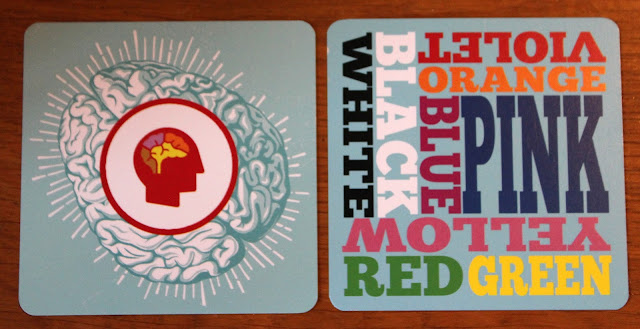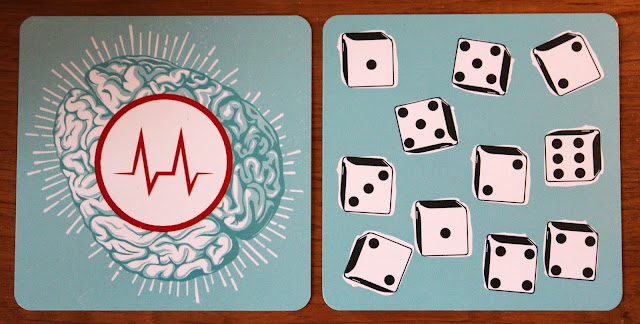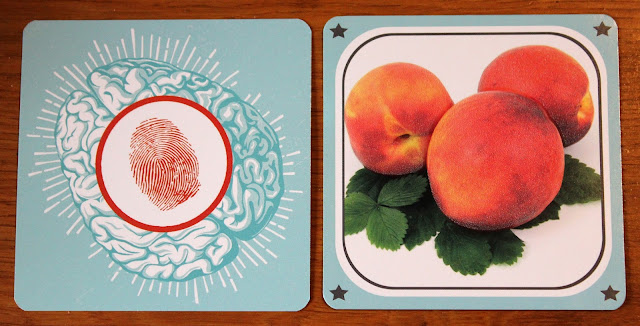Inside the neat little box is a deck of 'test' cards. Each one shows a puzzle which is simple in principle but made infinitely harder by the fact that you're trying to solve it before your friends do. If you're fastest to answer and get it right, you keep the card. This can then be used towards obtaining pieces of the little brain jigsaw that you need to complete to win the game.
Players take it in turns to flip over the top card of the deck. Since the cards are marked on the back with their test type, you can see what sort of thing is coming up. All players look at the newly revealed card and try to solve the test. If you think you have the answer, you put your hand over the card - this can become violent - and give your answer. Then you uncover the card and everyone stares at it for a while to check if you're right!
If you're right, you get to keep the card. If you win two cards of the same test type (matching card backs), you can exchange them for a brain piece and move one step closer to winning. If you get the answer wrong, you get to hang your head in shame whilst missing out on the next test.
There are eight kinds of test to complete:
Memory
The card I'm probably worst at! These show a number of different items that you need to remember. Without removing your hand from the card, you have to correctly name all the items on the card.Maze
Starting at the arrow, you have to figure out which letter correctly marks the exit of the maze.Colour
On these cards, only one word is written in its own colour and you have to find it first!(I've done similar tests to this when acting as guinea pig to friends' psychology experiments at university and, having played the game with a psychology teacher, found out it's called the Stroop test - fun and educational!)
Co-ordination
I've changed my mind, *these* are the cards that I'm worst at. I can't express how terrible I am at this bit. On the back of the co-ordination test cards is a little diagram of your hands, blue for left, red for right, with all the fingers numbered. On the front will be a picture of a face showing which fingers of which hand you have to place on the area shown (you cover the card up with the hand you're not using).Invariably I'm left looking confused at how everyone else has got it so wrong and then realising Oh wait, no, it's me. Again. Clearly I need more practise.
Duplicates
Spot which item on the card is repeated.Frequency
Spot which item appears the most times on the card.Reasoning
Figure out which shape fits into the gap on the diagram.Touch Challenge
This one is a bit different! When you see this fingerprint card, the player who won the previous test can attempt a 'touch challenge'.Cortex Challenge comes with a mini-deck of 10 raised texture touch cards which everyone gets to examine at the beginning of the game.
The players not taking the test select one of these and hand it, face down, to the challenger who then has to guess what it is using only their sense of touch. If they guess correctly they win a brain piece straight away.
The first person to complete their brain wins the game.
When I was sent a copy of this by Esdevium Games, it was pitched to me as 'similar to Dobble' and I can see where that comes from. It's all about thinking fast, making quick decisions and feeling deeply betrayed by your own brain. Cortex Challenge is a little slower to teach as you have to explain eight different challenges, but each of them are (in principle) simple so once you've gotten past the first game it's equally speedy.
The whole thing is very nicely put together, with good quality cards and great graphic design. Sometimes some of the animal drawings are a bit hard to identify at speed, but I guess that's part of the challenge!
The touch cards add a fun extra dimension; personally I haven't come across many tactile elements like this in games before, and where I have they've tended to annoy me a bit (feeling tetris pieces in a bag for Space Cadets springs to mind). This fits unobtrusively into the gameplay and provides something a bit different every so often.
I'd recommend this to anyone looking for a light but brain-engaging family party game - great for after dinner or before/between other longer games. My only worry is that you'd eventually get familiar with the cards after repeated plays, but I think playing the game has proven that my memory isn't good enough for that to be a real problem!
Cortex Challenge also comes in a couple of other versions: 'Geo' focuses on geographical puzzles and 'Kids' has simpler challenges for a younger audience.
Esdevium Games have kindly offered to send a copy of Cortex Challenge to one of my readers (UK only) - you can enter the giveaway below.
Cortex Challenge
Designer: Nicolas Bourgoin and Johan BenvenutoPublisher: Captain Macaque/Asmodee
Players: 2-6
Age: 8+
Cost: RRP £12.99, available from W H Smiths, Waterstones and independent stores (take a look at Esdevium's store locator to find a local brick-and-mortar retailer in Europe)
If you enjoyed this post perhaps you could take a look at my Facebook page and leave a like or come and say hello on my Twitter or Instagram feeds!
Cortex Challenge card game giveaway










